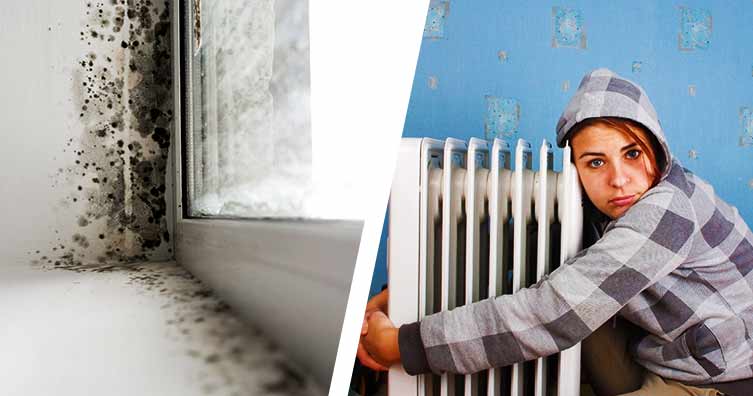You’ll soon be able to SUE your landlord if your house is too damp or cold
If you discover severe issues like these in your house, you'll soon be able to take your landlord to court and get compensation.

Credit: Burdun Iliya (left), Angorius (right) - Shutterstock
Come March this year, both private and social renters will be able to sue their landlord if they fail to sort out a range of issues in the property, including damp, mould and excessive temperatures (hot or cold!).
This law, which comes into force on 20th March, will apply in all circumstances unless a tenancy has lasted more than seven years.
The new Homes (Fitness for Human Habitation) Act will cover both your bedrooms and any communal areas of the building. And as well as ensuring any serious problems get fixed quickly, tenants will be able to claim compensation from the landlord.
You'll now be able to take your landlord to court, where a judge would be able to issue an injunction that forces them carry out the work.
What does the law cover?

Credit: HBO
In 1985, the Landlord and Tenant Act was introduced. This states that it was up to local authorities to investigate problems and poor conditions in properties.
However, with budget cuts meaning that many local councils are now struggling for cash, standards have been allowed to drop. As a result, some landlords have been getting away with providing poor facilities and not maintaining their properties properly.
The update to the Act states that your landlord will be breaking the law if the property is deemed "unfit for living". This could include serious issues concerning any of the following:
- Repair
- Stability
- Freedom from damp
- Internal arrangement
- Natural lighting
- Ventilation
- Water supply
- Drainage and sanitary conveniences
- Facilities for the preparation and cooking of food and the disposal of waste water
This law applies both at the beginning and throughout a tenancy, and also includes a so-called 'Grenfell clause'. This allows tenants to take action when there are issues with common areas in any shared buildings, in an effort to help avoid another tragedy like the Grenfell Tower fire.
Why is this law important?

Up until now the law has been very easy on landlords. This comes at the cost of tenant comfort, happiness and security, leading to occupants reporting horror stories about the conditions they've had to live in.
Housing and homelessness charity, Shelter, has calculated that currently there are nearly a million rented homes (affecting 2.5 million people) with hazards that pose a serious risk to the health and safety of tenants.
At the moment, private renters have to turn to local authorities to look into poor conditions, while tenants in social housing have no effective way to hold their councils to account.
Polly Neate, Chief Executive at Shelter, said:
It’s shocking that renters all over the country are forced to live in sub-standard and unsafe homes so this is an important first step towards giving them the rights they need.
Meanwhile, Heather Wheeler, the Minister for Housing and Homelessness, said:
This new law is a further step to ensure that tenants have the decent homes they deserve.
The number of people renting in the UK has increased significantly in the last 10 years, largely due to properties in some areas becoming less affordable. As such, this new law is all the more necessary to improve living conditions.
What to be aware of when renting

Credit: Channel 4
Deciding what property to rent can feel like a colossal job. Who should you live with, where should you rent, how much can you afford to pay? There are a whole list of decisions you need to make, and by the time you actually find somewhere you like, it’s tempting just to take it.
However, it’s worth doing a few checks before you sign on the dotted line. Research shows that one in eight students sign up to the first house they come across, and one third end up feeling like their property is poor value for money.
Take a look at this big checklist and read our list of things to check before signing your tenancy agreement to ensure you're not caught out.
- Discover more student housing horror stories in the first episode of our podcast
- Use this hack to get unlimited Big Mac and fries for £1.99
This includes checking for problems like damp and pests, considering the location and security of the house, and making sure you’re happy with features like the furniture, insulation, and water supply.
You also need to think long and hard about who you live with. Remember you'll be around these people every day, likely for at least a year, so it’s important everyone is happy with every other person they're sharing with.
And once you've made the final decision and snapped up your perfect property, make sure you reap the benefits of shared living. This includes deciding whether you need a TV Licence and choosing the most cost effective energy provider.
Cut the cost of your accommodation with our guide to saving money on rent!








